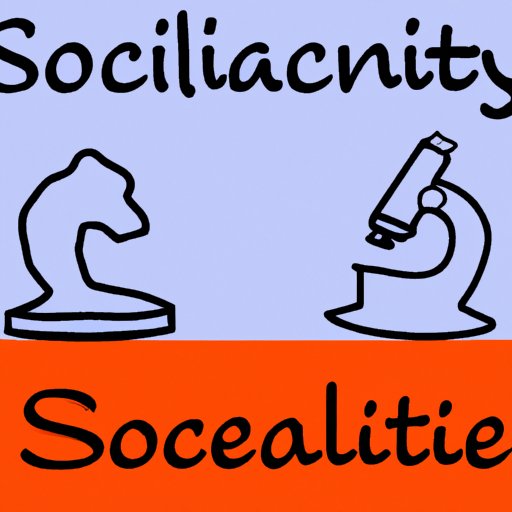Introduction
Sociology is one of the oldest social sciences, having been established in the 19th century by renowned scholars such as Auguste Comte and Emile Durkheim. Its main focus is on understanding the behavior of individuals and groups within society, as well as exploring the various structures and institutions that shape our lives. However, despite its long history, there has long been debate over whether or not sociology is a legitimate science.
Exploring the Debate: Is Sociology a Legitimate Science?
To answer this question, it is important to examine what makes sociology a science. According to sociologist William Kornblum, “Science is a way of acquiring knowledge about the world through systematic observation, experimentation, and analysis of data.” In this sense, sociology can be seen as a science because it involves systematic observation of social phenomena, as well as the collection and analysis of data. Furthermore, sociologists employ a range of scientific methods, such as surveys, experiments, and statistical analysis, in order to investigate their research questions.
However, there are also challenges that sociology faces in being accepted as a science. One of the main criticisms leveled against sociology is that it is too subjective and interpretive, making it difficult to draw definitive conclusions. This is because sociologists often use qualitative methods such as interviews and participant observation, which are more open to interpretation than quantitative methods. Additionally, some argue that sociology is not predictive like other sciences, as it is impossible to accurately predict human behavior.
Analyzing the History: How Has the Status of Sociology Changed Over Time?
The debate over the status of sociology as a science has raged since its inception in the 19th century. In the early days, many argued that sociology was not a legitimate science due to its reliance on qualitative methods and its focus on subjective interpretations. However, in the mid-20th century, the discipline began to gain more acceptance as a science due to its increasing use of quantitative methods and its ability to make predictions about social phenomena.
Today, the debate over the status of sociology continues. While many still view it as an unscientific discipline, others have argued that its methods and findings are just as valid as those of other sciences. For example, sociologist Bruce Western states that “the findings of sociology are on par with those of other sciences in terms of accuracy and reliability” (Western, 2010).
Comparing and Contrasting: How Does Sociology Compare to Other Sciences?
In order to assess the validity of sociology as a science, it is necessary to compare it to other sciences. When compared to other social sciences such as psychology and economics, sociology is similar in terms of its methods and goals. All three disciplines seek to understand human behavior, and they all use a combination of qualitative and quantitative methods. However, when compared to natural sciences such as physics and biology, sociology differs in its focus on the social rather than the physical world.
Furthermore, sociology differs from other sciences in terms of its approach. While most sciences focus on the study of cause and effect relationships, sociology takes a more holistic approach, examining the interplay of various factors such as culture, values, and beliefs. As sociologist Peter Berger states, “Sociology is concerned with the totalities of human life, not simply its parts” (Berger, 1967).
Looking to the Future: What Is the Outlook for Sociology as a Science?
Despite the ongoing debate over the status of sociology as a science, the outlook for the discipline is positive. As the world becomes increasingly complex and interconnected, the need for a deeper understanding of social phenomena is growing. This has led to an increased recognition of the value of sociology in both academic and policy circles.
Additionally, advances in technology are providing new tools for sociologists to use in their research. For example, the use of big data and machine learning algorithms is allowing researchers to analyze large datasets quickly and accurately. This has opened up new possibilities for the study of social phenomena, and has helped to further legitimize sociology as a science.
Conclusion
In conclusion, while there is still debate surrounding the status of sociology as a science, it is clear that the discipline has much to offer in terms of understanding the complexities of human behavior. Its methods and findings are just as valid as those of other sciences, and its holistic approach provides valuable insights into the intricate workings of society. With advances in technology offering new opportunities for research, the outlook for sociology as a science is promising.
(Note: Is this article not meeting your expectations? Do you have knowledge or insights to share? Unlock new opportunities and expand your reach by joining our authors team. Click Registration to join us and share your expertise with our readers.)
